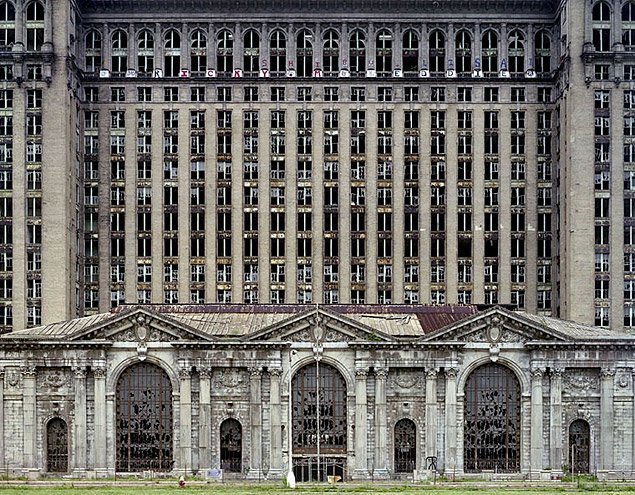
In an article entitled, ‘So Long Detroit,’ Daniel Greenfield writes the following about the bankrupt, economically declining city:
Detroit did what most cities do. It did what the country does, it tried to make ends meet by borrowing money even though it had no prospects for paying the money back. And when that failed, it went to bankruptcy court to try and reinvent Detroit as a brand new city that gullible investors will want to lend money to. There’s no stage beyond that because the city isn’t viable because it has no purpose.
The purpose of a city has become to take care of the people who live there. Living in a city offers the appeal of a larger social safety net. The population that needs the safety net the most also pays the least into it, making the proposition a bad deal.
‘We have gone from the city as a model of industrial production to the city as a model of industrial social welfare. The former can pay for the latter, but the latter cannot pay for the former. (Source: sultanknish.blogspot.com, 7/23/13)
Most Americans don’t think Detroit’s collapse has anything to do with the rest of the country. But most Americans are in denial.
Denial refers to a ‘defense mechanism,’ to use the classical psychological term. A defense mechanism is a false belief one employs to lower anxiety. While lowering anxiety is usually a good thing, not so at the expense of facing reality. That’s why so many people, in their personal lives, go wrong when it comes to containing their spending, their other bad habits or their personally toxic relationships. Denial keeps them from seeing the truth, until it’s too late.
The same applies to a nation or society. A nation or society consists of nothing more than individuals. In the United States especially, the dominant attitude for most people about economic decline is, ‘It can’t happen here. It’s America, after all.’
But it can happen here. The laws of economics, mathematics and human nature apply in America no more or less than anywhere else. Detroit is an especially good example of where all of America will go, if and only if its present course is left unchecked. And yes, we’re already too far gone to avoid the inevitable pain of living beyond one’s means.
Most people will assume Detroit suffers only because the auto industry has collapsed. They see it as an isolated event. But why did the auto industry collapse? Could the unions, whose policies enjoyed the backing of the federal government, be responsible for making the industry less competitive than it otherwise would have been?
And what about the bailouts of Obama’s first term? Those were supposed to save the auto industry, and Detroit as well. Yet Detroit is bankrupt and people are fleeing the state. Detroit is part of the United States of America, and by all reports it’s starting to resemble a third world country.
It can happen in America, and it already has.
Greenfield nails it when he says elsewhere in his article, ‘The city’s troubles are America’s troubles. A thriving economy can support a welfare state, but a welfare state cannot be an economy.’
Bingo! A welfare state cannot be an economy.
You can argue about whether, or how much, the government should be involved in providing social insurance, food stamps, welfare, corporate subsidies, union favors and all the rest. What you cannot dispute is that a welfare-entitlement state will not produce the goods. A welfare-entitlement state can deliver the goodies (for a time), by using government force, but it cannot generate the wealth which makes such goodies possible. Therein lies its fatal flaw.
If you decided that your economically troubled next-door neighbor needed, and was entitled to, your help, then you’d be free to hand everything you earn over to that neighbor. Your neighbor would become dependent on your income, and perhaps even start to feel entitled to it.
The more you hand over growing portions of your paycheck, the more your neighbor would demand. On the premise that you are—as Barack Obama tells us repeatedly—your brother’s keeper, you’d keep handing over more and more, until eventually you had no more to give.
At some point, you’d lose your house and your own ability to survive. The goodie flow would be over for your neighbor, and now you’d be just as dependent on someone else’s wealth or charity as your neighbor previously was on yours.
Giving until it hurts, we’re told, is the essence of moral virtue. The more you hurt, the more virtuous it’s supposed to be. In psychology, we call this sadomasochism. In actual practice, giving until there’s nothing left to give only creates destruction, dependence and hardship for all. Look at Detroit. It’s a living tribute to the alleged ideal that we are all our brother’s keepers.
Be sure to “friend” Dr. Hurd on Facebook. Search under “Michael Hurd” (Rehoboth Beach DE). Get up-to-the-minute postings, recommended articles and links, and engage in back-and-forth discussion with Dr. Hurd on topics of interest.
